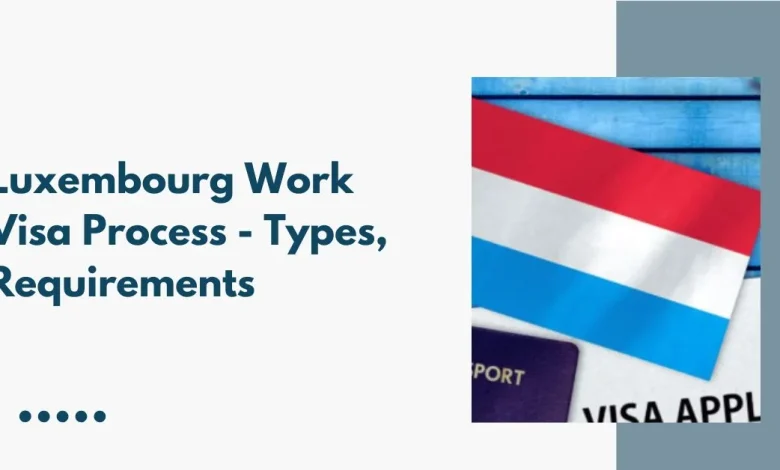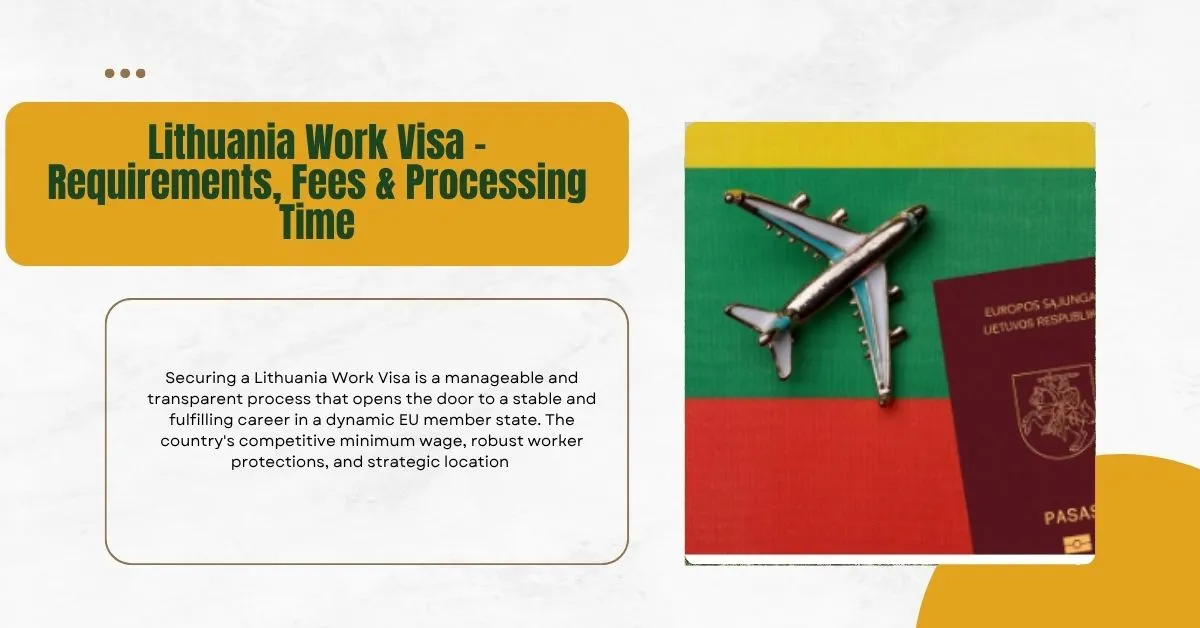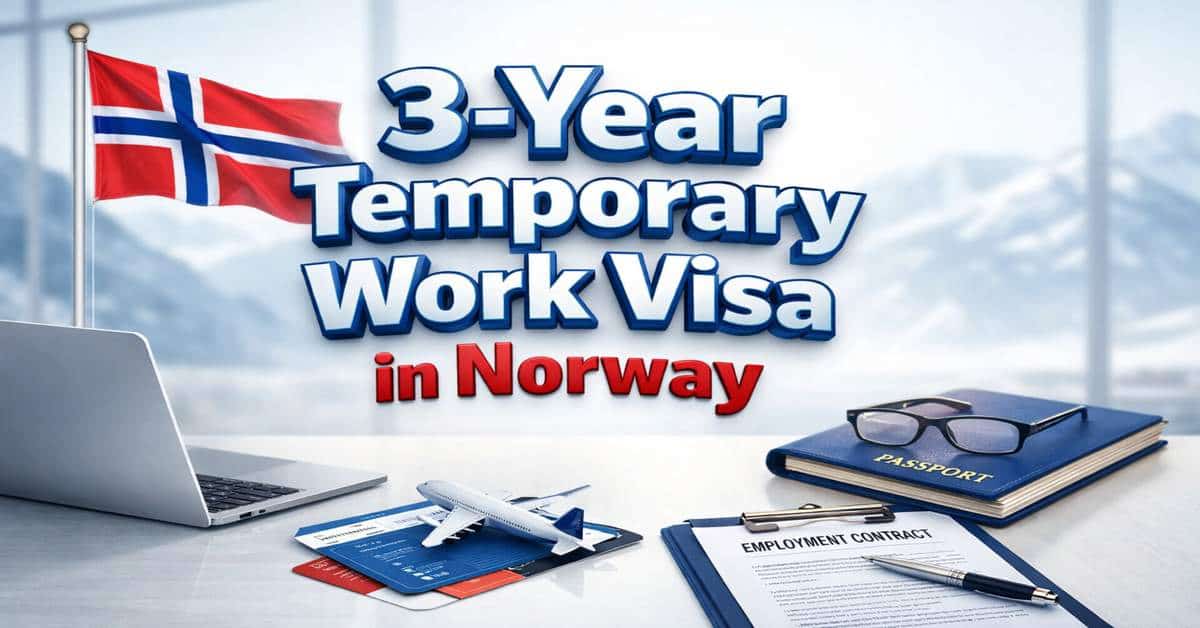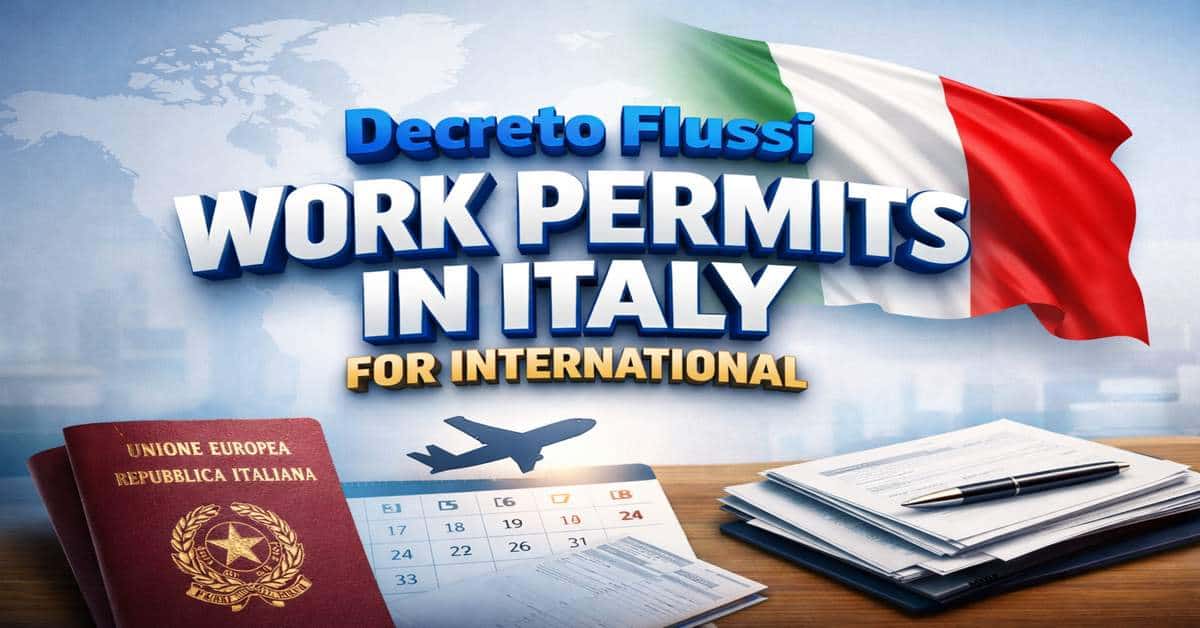Luxembourg Work Visa Process 2026 – Types, Requirements

For job seekers, Luxembourg, a small but thriving nation in central Europe, provides a wealth of options. Because of its strong economy, varied culture, and high standard of living, Luxembourg draws experts from all over the world. Knowing how to apply for a work visa is essential if you’re thinking about working in Luxembourg. The qualifying requirements, application processes, types of work visas, and crucial advice for a successful application are all covered in this comprehensive reference to the Luxembourg work visa process for 2026.
Why Work in Luxembourg?
Knowing why Luxembourg is a desirable location for professionals is crucial before beginning the visa application process.
- High Standard of Living: Because of its first-rate public services, healthcare, and educational system, Luxembourg continuously scores highly on indexes of quality of life. The nation also has stunning scenery and a clean, safe atmosphere.
- Strong Economy: Luxembourg has one of the highest GDPs per capita worldwide. There are many job opportunities in the banking, financial, and technology sectors, which propel its economy.
- Multicultural Environment: Luxembourg is home to a diverse population and serves as a center for international organizations and businesses. It is simpler for expatriates to adjust and prosper in this mixed environment.
Read Also: Accountant Jobs in Luxembourg With Visa Sponsorship
In-Demand Professions in Luxembourg
According to Guichet and CEDEFOP, the following professions are currently experiencing skill shortages in Luxembourg:
Financial Services
- Investment Bankers
- Wealth Managers
- Risk Management Specialists
- Compliance Officers
Information Technology
- Software Engineers
- Cybersecurity Specialists
- Data Analysts
- IT Project Managers
Healthcare
- Doctors
- Nurses
- Psychologists
- Pharmacists
Engineering and Manufacturing
- Mechanical Engineers
- Civil Engineers
- Electrical Engineers
- Production Engineers
Other Areas
- Logistics Professionals
- Hotel and Tourism Industry Experts
- Legal Experts
- Multilingual Professionals
Where to Find Skill Shortage Jobs in Luxembourg
- The National Employment Agency, or ADEM, has a useful website that lists in-demand positions under “métiers en pénurie” (skills in demand). A quarterly report outlining Luxembourg’s skill gaps is also released by them. See what they have to offer here.
- Guichet.lu: Information on shortage vocations is frequently updated on this official government webpage. Go to their website here.
- Luxembourg-specific data is included in the comprehensive reports on mismatch priority occupations provided by Cedefop (European Centre for the Development of Vocational Training). Check out their observations here.
- Specialized Websites: Eurostat and other websites provide detailed information on skill shortages throughout the European Union. The Luxembourg Ministry of Economy also identifies industries that urgently require skilled labor. Go to the Ministry of Economy here and Eurostat here.
Types of Work Visas in Luxembourg
Luxembourg provides a variety of work visas to suit various worker classifications and employment requirements. The first stage in the application procedure is to choose which visa is best for your circumstances.
1. Short-Term Work Visa
This visa is intended for people who intend to work in Luxembourg for a maximum of ninety days. It is appropriate for conferences, short-term assignments, and business travel.
Eligibility:
- a legitimate contract or job offer from a company in Luxembourg.
- Evidence of lodging in Luxembourg.
2. Long-Term Work Visa
Those who intend to work in Luxembourg for longer than ninety days are eligible for the long-term work visa. This visa permits longer employment but requires extra paperwork and clearance.
Eligibility:
- employment agreement with an employer in Luxembourg.
- experience and credentials that are appropriate for the position.
- Evidence of lodging in Luxembourg.
3. EU Blue Card
The EU Blue Card is intended for highly qualified non-EU workers. One of its many advantages is that it makes obtaining permanent residence simpler.
Eligibility:
- A university degree or a comparable credential.
- employment agreement that pays at least 1.5 times Luxembourg’s average gross yearly income.
- Evidence of accommodations.
4. Self-Employment Visa
Entrepreneurs and independent contractors who want to launch or operate their own businesses in Luxembourg are eligible for this visa.
Eligibility:
- a thorough business plan.
- Evidence of funding to sustain the company.
- relevant training and expertise.
Step-by-Step Guide to the Luxembourg Work Visa Process
There are various processes involved in applying for a work visa to Luxembourg. This thorough guide will assist you in completing each step.
Step 1: Secure a Job Offer
You need to have a confirmed job offer from an employer in Luxembourg before you can apply for a work visa. A comprehensive employment contract detailing your job position, compensation, and other important clauses should be provided by the company.
Step 2: Prepare Required Documentation
One of the most important steps in the visa application procedure is assembling the required paperwork. Before submitting your application, make sure you have all the necessary documents on hand. Typically, the following documents are needed:
- A valid passport must last for at least six months after the length of time you plan to stay there.
- Your employer and you both sign the employment contract.
- Proof of Accommodation: Information about your Luxembourg lodging arrangements.
- Verified documents of your degrees and certifications attest to your academic and professional credentials.
- Medical Insurance: Documentation of valid health insurance in Luxembourg.
- Financial Proof: Documentation proving you have enough money to sustain yourself, such as bank statements.
- A clean criminal record is a certification issued by the authorities of your home country.
Step 3: Submit Application to the Immigration Directorate
In Luxembourg, your employer usually starts the application procedure by sending the Immigration Directorate your employment contract and other pertinent paperwork. This stage entails:
- Ministry of Labor approval: To guarantee that the application satisfies employment standards, the Ministry of Labor must approve it.
- Application for Work Permit: On your behalf, the employer applies for a work permit.
Step 4: Apply for a Long-Stay Visa (D Visa)
You must apply for a long-stay visa (D Visa) at the Luxembourg embassy or consulate in your home country after your work permit is granted. You can enter Luxembourg and begin working with this visa.
Required Documents:
- Approved work permit.
- Valid passport.
- Proof of accommodation.
- Employment contract.
- Proof of financial means.
- Health insurance coverage.
- Visa application form.
Step 5: Enter Luxembourg and Register with Local Authorities
You are permitted to enter Luxembourg after obtaining your long-stay visa. Within three days of your arrival, you have to register with the local government.
Registration Steps:
- Go to the municipal office in your community.
- Show your proof of lodging, passport, and visa.
- Fill out a form stating your arrival.
Step 6: Obtain a Residence Permit
You have to submit an application for a residence permit after registering with the local government. For the term of your job contract, you are permitted to live and work in Luxembourg.
Required Documents:
- Passport and visa.
- Employment contract.
- Proof of accommodation.
- Health insurance certificate.
- Medical examination report.
- Biometric data (photographs and fingerprints).
Step 7: Attend the Integration Course
All newcomers to Luxembourg must take an integration course. The history, culture, and legal system of Luxembourg are covered in this course, which will facilitate your social integration.
Tips for a Successful Luxembourg Work Visa Application
Although navigating the work visa procedure might be challenging, you can improve your chances of success by using these tips:
1. Start Early
Start the application process well in advance to avoid delays. Because processing periods can vary, it is crucial to have adequate time to gather papers and complete each stage.
2. Ensure Accuracy
Verify the accuracy of all forms and papers one more time. Your application may be delayed or rejected if you provide inaccurate or incomplete information.
3. Maintain Clear Communication
Throughout the application procedure, stay in constant communication with your company and the appropriate authorities. Answer any requests for more information as soon as possible.
4. Seek Professional Assistance
For assistance with the procedure, think about speaking with a visa counselor or an immigration attorney. Their knowledge can assist you in navigating intricate criteria and steering clear of typical dangers.
5. Stay Informed
For the most recent information on visa regulations and procedures, visit the official websites of the Luxembourg government on a regular basis. Regulation changes may have an effect on your application procedure.
Conclusion:
International professionals looking to work in a booming economy with a high standard of living will find that Luxembourg provides great career opportunities. You can obtain a Luxembourg work visa in 2026 by being aware of the various kinds of work visas, fulfilling the prerequisites, and completing the application process in its entirety. A seamless visa application process depends on being knowledgeable, getting started early, and making sure your paperwork is accurate. Luxembourg can be a fulfilling and successful place for your overseas job if you prepare properly.
Frequently Asked Questions
Who needs a work visa to work in Luxembourg?
Non-EU/EEA nationals must obtain a valid work visa and residence permit before working in Luxembourg.
What is the EU Blue Card and who is eligible?
The EU Blue Card is for highly skilled non-EU workers. Applicants need a university degree and a job offer with a salary at least 1.5 times the national average.



